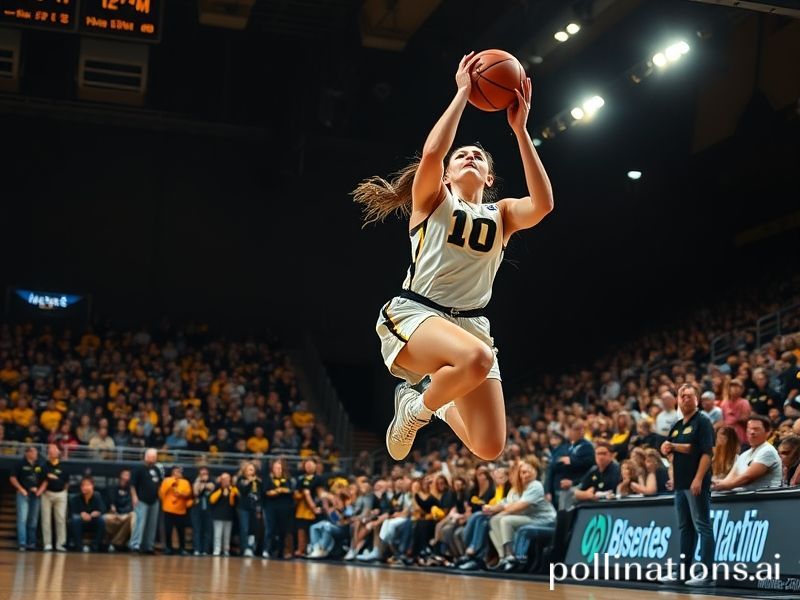Caitlin Clark: How One Iowa Sharpshooter Became the Planet’s Accidental Geopolitical Weapon
Caitlin Clark and the Global Soft-Power Dunk Heard ’Round the World
By: Our Man in the Cheap Seats, Foreign Correspondent Emeritus
If you’ve spent the past year orbiting anywhere outside the American sports-media bubble—say, sipping overpriced espresso in Rome or watching North Korean missile parades on mute in a Seoul hotel bar—you may have missed the name Caitlin Clark. That’s forgivable; the WNBA doesn’t yet rival the Champions League for prime-time bragging rights in most time zones. But Clark is less a basketball player than a geopolitical weather pattern in Nikes, and the front offices of several anxious governments have learned to track her box scores the way meteorologists eye typhoons.
Start with the numbers: 3,951 career NCAA points, the all-time collegiate scoring record, male or female. In real-world translation, that’s roughly the population of Liechtenstein condensed into jump-shots, each swish a silent referendum on American exceptionalism. When Clark uncorks a logo three, somewhere in Beijing a propaganda flack updates the “decadent West” slide deck; in Lagos, a local streaming start-up renegotiates WNBA broadcast rights; and in Paris, the Ministry of Sport quietly recalculates how many suburban arenas they must refurbish before the 2028 Los Angeles Olympics so France doesn’t look completely irrelevant on the hardwood.
The international ripple effect is deliciously ironic. Here is a 22-year-old from rural Iowa, population one stoplight and several disapproving corn stalks, whose greatest crime so far is making the rest of planet Earth look like it’s playing in slow-motion. Clark’s style—half-court lobs that seem to violate several laws of physics, plus the audacity to shimmy after them—has turned the WNBA into must-watch export content faster than Netflix can greenlight a Korean zombie soap. Commissioner Cathy Engelbert now fields calls from Saudi investors who previously thought “pick and roll” was a sushi order. The Saudis, ever subtle, reportedly offered to build a dedicated megadome in Riyadh provided Clark play a season in an abaya. Negotiations continue; the abaya might include Nike Swoosh branding, because capitalism never misses an open layup.
Meanwhile, the Chinese Basketball Association is re-examining its talent pipeline after state media aired a primetime highlight package titled “Why Can’t Our Guards Do That?” The segment ran for seven minutes, followed by a twenty-minute infomercial for a domestic jump-shot app that drains your phone battery faster than it improves arc rotation. Soft-power scoreboard: USA +3, Confucian shame spiral +0.
Europe, ever the self-appointed conscience of world sport, has responded with typical hand-wringing. German broadsheets fret that Clark’s swagger represents “American hyper-individualism,” which is code for “she makes our national team look like they’re running a government office.” French sports philosophers, who can ruin anything with a Foucault reference, have declared her play “a post-modern critique of Cartesian space.” Translation: they have no answer for the 30-foot pull-up three.
Even the war zones are tuning in. Ukrainian soldiers reportedly stream WNBA games on trench tablets during lulls in artillery, proving once again that humanity’s appetite for hope is matched only by its need for decent Wi-Fi. Somewhere in the Kremlin, an analyst drafts a memo: “If American soft power now includes lesbian-coded corn-fed sharpshooters, our nuclear deterrent may require rebranding.”
And then there’s the money. Clark’s rookie contract with the Indiana Fever pays $76,535 per year—roughly what a mid-tier Bundesliga benchwarmer blows on artisanal schnitzel. Yet her Nike deal, reportedly in the eight-figure ZIP code, signals a future where the real salary cap is set by global sneaker demand. When kids in Nairobi barter knock-off Clark jerseys for data bundles, you know the brand halo has eclipsed the basketball itself. Capitalism, like gravity, bends everything toward profit; Clark just happens to sell very bendable jumpers.
All of which suggests that Caitlin Clark is not merely a generational talent but a convenient vessel for the planet’s endless appetite for narratives: the underdog myth, the gender-barrier demolition derby, the soft-power arms race disguised as sport. Someday she’ll retire and open a winery in Napa, and the world will find new demigods. But for now, every deep three is a tiny, orange reminder that in the game of nations, the most dangerous weapon is still a 22-year-old with range.







